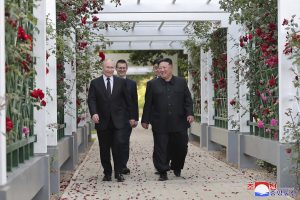Since Russia invaded Ukraine, North Korea has derived remarkable benefit from its consistent support for the Putin administration. Indeed Pyongyang was able to conclude a “comprehensive strategic partnership treaty,” comparable to the Soviet-North Korean military alliance during the Cold War. As the fighting in Ukraine dragged on, Russian President Vladimir Putin was forced to approach North Korea for help with weapons, and Putin in fact visited North Korea for the first time in 24 years, reciprocating a visit that North Korean leader Kim Jong Un made to Russia in September last year.
Moscow has always seen North Korea as a lesser player, and besides Putin neither Soviet nor Russian leaders bothered traveling to Pyongyang, so even Putin’s 2000 visit was significant. This newly signed treaty is now calling for a strengthening of comprehensive cooperation in various fields, evidence that the two countries are enjoying something of a second honeymoon.
Putin has stated that the “indefinite restrictive regime of the U.N. Security Council against North Korea must be revised,” while announcing that Russia would promote economic cooperation with North Korea. This could help North Korea deal with its chronic energy shortages. For its part, North Korea has already resumed accepting tourists from Russia only, and interpersonal exchanges between the two countries are likely to become more active.
Of particular importance to North Korea is that it has gained a security backer. The treaty stipulates, “In case any one of the two sides is put in a state of war by an armed invasion from an individual state or several states, the other side shall provide military and other assistance with all means in its possession without delay…” Whether or not this so-called “automatic intervention clause” will actually function depends on how it is interpreted by both Russia and North Korea, but the fact that it was signed and publicly released will serve as a check on the United States and South Korea.
An editorial in the Workers’ Party newspaper Rodong Sinmun to welcome Putin stated that Russia “expresses its firm support for our [the North Korean] people’s struggle as we deploy nuclear deterrence.” This makes it sound like Russia supports North Korea’s nuclear program, although Putin has not actually said as much, at least not publicly.
Nonetheless, the editorial arguably is an expression of North Korean intentions. The North Korea-Russia treaty carries the same meaning as the China-North Korea treaty that has been in place since the Cold War. Establishing similar relationships with both Russia will allow North Korea to hedge against risk in case relations deteriorate with either power. It is promoting a balanced diplomacy that puts China and Russia on the scales.
Although North Korea has continued to conduct missile tests, it has refrained from nuclear testing for more than six years. Kim has had no choice but to accommodate Beijing’s opposition to nuclear testing since his first summit with President Xi Jinping in March 2018.
However, if Russia were to take a stance that accepted North Korean possession of nuclear weapons, nuclear testing may once again become a possibility. For North Korea, Russia acts as a counterbalance to China in what appears to be an imitation of the diplomacy of Kim’s grandfather, President Kim Il Sung.
In July 1961, Kim Il Sung signed the Soviet-North Korean alliance with Soviet Premier Nikita Khrushchev in Moscow, after which he personally visited Beijing to conclude a similar military alliance with Premier Zhou Enlai. These agreements were meant to counter the alliances that the United States had formed with South Korea and Japan. After signing the alliances, Pyongyang avoided becoming dependent on either China or the Soviet Union; rather, it managed to receive support from both of its giant neighbors, maintaining a reasonable distance and plotting its own course.
Like his grandfather, Kim Jong Un will likely also seek to carefully cultivate relations with both China and Russia. Even now that he has won a new treaty with Putin, there is no guarantee that Russia will be able to support North Korea in the event of an emergency. Russia is approaching North Korea out of self-interest in order to wage war in Ukraine, and it likely has no intention of sacrificing itself for North Korea.
However, if North Korea believes that it can enjoy Russian support in the U.N. Security Council and elsewhere, even if it incurs Xi’s wrath by conducting nuclear tests, it will have gained more of a free hand in its weapons program.
This year has been designated as the “Year of Friendship” to commemorate the 75th anniversary of the establishment of diplomatic relations between China and North Korea. Nonetheless, Xi and Kim have not met in more than five years. China is not as overtly “anti-American” as Russia and North Korea, and it doesn’t seem to want to get caught up in the “new Cold War” repeatedly mentioned by Kim Jong Un.
Since mid-May, the Rodong Sinmun has seldom made mention of Xi Jinping. This is a bit of an anomaly given its history of publishing numerous commentaries on Xi’s policies. Observers have also pointed out that the footprints installed to commemorate the Chinese and North Korean leaders’ stroll through the Dalian park in May 2018 have been erased.
It seems reasonable to conclude that China-North Korea relations appear to have entered a rough patch. With Kim now appearing to be pursuing a diplomatic policy of balancing relations with China and Russia, it will be interesting to see if Xi allows a summit meeting with Kim to take place during this anniversary year.

































